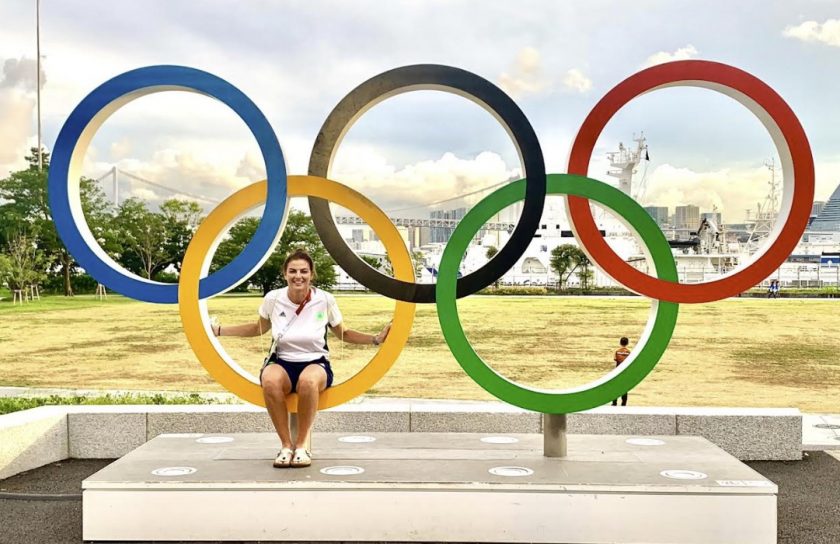Glyndwr University student shares experience of Tokyo 2020 Olympic Games as part of Team Ireland staff

A Wrexham Glyndwr University student has spoken about her experience of working for Team Ireland at the 2020 Olympic Games in Tokyo.
Dr Ciara Losty, who is a lecturer in Sport and Exercise at Waterford Institute of Technology in Ireland, is currently on the MSc Psychology Conversion course part-time at Glyndwr.
Having worked with various athletes in the build-up to the Games, which were postponed for a year due to the pandemic, Ciara travelled to Tokyo to offer wellbeing and pastoral support in the aftermath to those who had competed for Ireland.
Speaking about the experience, Ciara said: “The main sports I work with at the moment are equestrian eventing, three-day eventing, I work with a sprinter, and I work in modern pentathlon as well.
“I had a dual role at the games. I was Performance Psychologist for the equestrian, and Team Ireland has put in a decompression programme for when athletes had finished competing. So my job was that within 48 hours of everybody that had finished competing for Team Ireland, they had a check-in with myself just to see how they were doing.
“We see all the good stories on TV, but some athletes may have been disappointed with their Olympic experience or performance, so they would have a check-in with me on the ground in Tokyo within 48 hours whether it was via Zoom, or in person.
“I’m interested in the person first, athlete second, it’s not a formal performance debrief – they would have that with their performance coaches – it’s more about wellbeing.
“Because of Covid restrictions it was incredibly tight – once you had finished competing you had to leave Tokyo within 48 hours so there was lots of logistical things I’d never had to contend with before.
“Now we’re providing post-Games decompression support, between now and December, I will go to see everybody.
“There are 134 eligible athletes from Team Ireland and I will either meet them to offer support or do it online, and help them transition to maybe the next cycle for Olympians, or maybe if it didn’t go too well they need some clinical type of support, they could need financial support, they could be going back to college.
“We’re working with that age group of people who are probably starting families, settling down, late teens to late 20’s – to bridge that gap, be that contact for them. Sometimes it’s difficult to reach out for support, so I’m that ‘go to’ person.
“One of the questions you ask is did the experience meet up to their expectations? Afterwards, they could be thinking ‘Is that it? What was all that about? Now it’s over, what do I do next?’ People had trained for this cycle for five years.”
The ongoing pandemic and restrictions in Tokyo meant there were even more challenges for athletes and staff to contend with, including lack of socialising with friends and family, and performing in near empty venues, which Ciara – who had previously been to the 2012 Olympic Games in London with Team Ireland in a similar role – said made it a very different experience.
“I know what it’s like because I’ve been to other Games, what it’s like when the crowd is there, the buzz, the atmosphere, your family”, she said.
“Nobody had family or friends there, nobody could be meeting up for coffee, it was so clinical, it’s about understanding the emotions of what they’re going through at the time.”
Having enjoyed such a good experience when studying for her PhD at Glyndwr, Ciara says she had no hesitation in returning to the University when she sought to enroll on a conversion course.
“My primary Degree is in Sports Science, I did a Research Masters in Sports Psychology, and then I actually did my PhD at Glyndwr”, she said.
“I had a really positive experience at Glyndwr. That was five or six years ago, so I’ve always kept an eye on the University as an alumni even though I’m in Ireland, and the one piece that was missing for me from an Accreditation perspective was the BPS component because I don’t have an Undergraduate Degree in Psychology, even though I had a PhD.
“When I was looking at the way different courses are structured here (in Ireland) it’s more flexible for me to go to Wales where there are those types of programmes than here where it’s two or three evenings a week. Because I’m based in the south-east of Ireland in Waterford, not in Dublin, it would be a two-hour drive two nights a week which is not going to happen with a family.
“The residential weekends are good, they’re fixed dates in advance, delivered in a condensed format. You’re getting a significant component of work done while you’re there – and I can get stuff done on the ferry on the way over too.
“The flexibility of it going online, the content is great. I’ve always felt really supported, you get one-to-ones, the smaller class sizes mean you get to know people, that support is amazing.
“It’s made me think about how I deliver things as a lecturer and the support I give others as well.”
For more information about the MSc Psychology Conversion course at Wrexham Glyndwr University, visit https://www.glyndwr.ac.uk/en/Postgraduatecourses/PsychologyConversion/
Spotted something? Got a story? Email: [email protected]
Latest News
